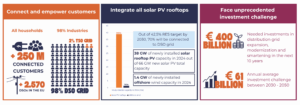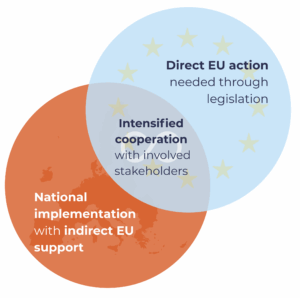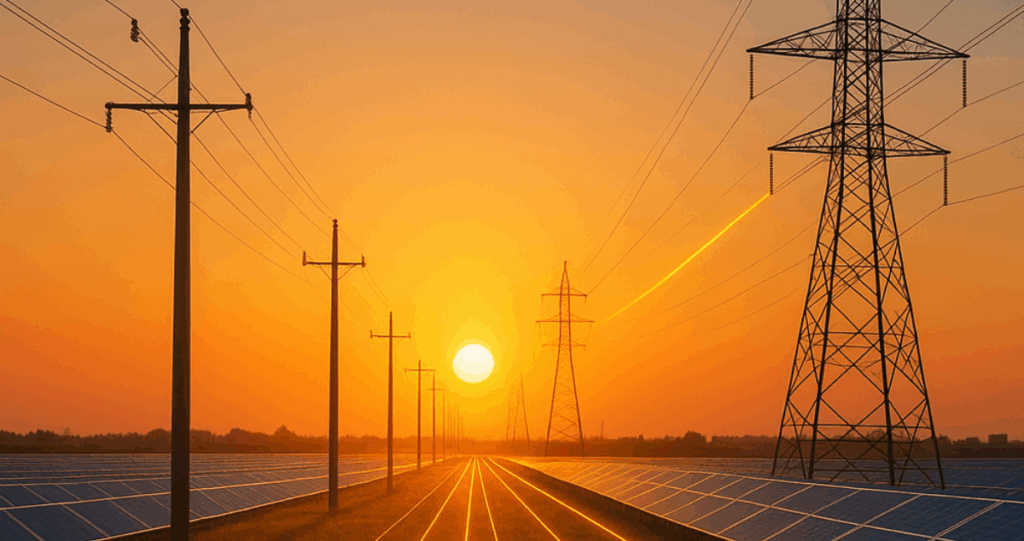On 13 October, DSO Entity published its recommendations for the upcoming European Grids Package announced for late November. The publication builds on the delivery of the Grid Action Plan and assesses what actions are still necessary to fulfill the EU’s objectives and what level of support is needed for DSOs at the EU and national levels. DSO Entity’s booklet unveils three key principles that should guide decision-makers in developing the Grids Package. It also includes detailed recommendations to ensure grids are fit for purpose in the long run while highlighting the importance of DSOs for a decentralised future.
Why is the Grids Package needed?
The European Commission has made clear its intention to assess the suitability of the EU legal framework for grids and announced a European Grids Package to accelerate the expansion, modernisation and digitalisation of the grids. The package is expected to take the form of both legislative and non-legislative proposals including a revision of the TEN-E Regulation alongside other initiatives foreseen on permitting simplification, funding or network planning.
The Grids Package will build on the actions and achievements of the Grid Action Plan that concluded in June 2025 during the Copenhagen Infrastructure Forum and successfully delivered all assigned Action Points with DSO Entity actively contributing to many of them. However, the European regulatory framework for grids is not yet fully adapted to the new decentralised energy system and more needs to be done to ensure the right conditions for grids in the long term are in place.
The Grids Package and the role of DSOs
The current legal framework remains predominantly cross-border oriented with little inclusion of the distribution grids. The Grids Package should therefore be used as an opportunity to address some of the outstanding challenges faced by distribution grids and follow a system-of-systems approach to ensure DSOs are not overlooked given their key role in the EU’s transition to decarbonisation, competitiveness and resilience (see illustration below). The upcoming legislative and non-legislative proposals should treat DSOs and TSOs equally through balanced EU legislation regarding their roles and responsibilities to guarantee good coordination and cooperation also at the national level.

Illustration: Role of DSOs as key facilitators of the EU’s energy transition.
What should the Grids Package address?
The Grids Package needs to provide the right mix of measures at the EU and national levels to ensure efforts are maintained where needed and new legislative measures are set where appropriate. While for some areas like funding and financing more direct EU support is necessary to guarantee the right investment climate, for others such as for distribution network planning, efforts should be put into supporting implementation, sharing good practices and bringing visibility and transparency.
DSO Entity’s publication provides a detailed overview of recommendations for core grid areas and sets three principles that should guide the Grids Package as listed below:
1. Targeted direct EU actions: Enhanced direct EU actions are needed to address remaining challenges, especially in the areas of funding and financing and other strategic topics:
- Clearer EU-guidance for NRAs to guarantee the right investment climate for grids at the national level.
- Better funding and financing support at the EU level such as providing earmarking of funds for DSOs (MFF) and ensuring greater focus on smart grid projects in CEF-E.
- EU leadership and support on strategic topics with geopolitical relevance, such as for supply chains, public procurement, staffing, and skills.
- Ensuring the timely adoption of secondary acts on technical rules (e.g., Network Code on Demand Response or on Requirements for Generators)
2. Implementation and indirect EU support: Ensure the implementation of existing EU legislation and strengthen EU guidance to support Member States in tailoring solutions to local realities.
- Ensuring and supporting the implementation of existing European rules (e.g. forward-looking regulatory frameworks, anticipatory investment, permitting).
- Providing guidance in cooperation with DSO Entity on national topics (e.g. Distribution Network Development Plans, public engagement).
- Facilitating a system-of-systems approach treating DSOs/TSOs on an equal footing in EU-legislation.
3.Collaborative governance: Improve coordination and alignment between key-institutional partners on different levels to foster cooperation and knowledge sharing in a more complex system-of-system.
- Continuation of collaboration within the GAP’s non-legislative framework to generate results via the sharing of knowledge and good practices, thereby providing greater visibility and EU-wide transparency on topics with more national characteristics (e.g. grid hosting capacities, network planning).
- Intensification of a collaborative approach at the EU level to help to understand the differences and diversity of national approaches rather than to unify or standardise one-size-fits-all solutions over all voltage levels.

Illustration: Three guiding principles for the Grids Package.
To read DSO Entity’s full recommendations, press here.


